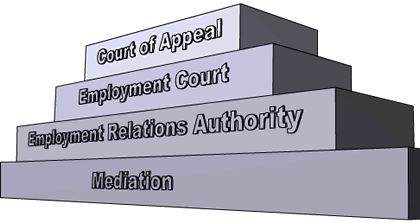When we talk about dispute resolution here, we are talking about the resolution of different types of employment relationship problems that parties might experience. The Employment Relations Act defines disputes as arguments over the application of certain terms and conditions within the employment agreement.
Dispute resolution processes under the Employment Relations Act
Under the Act, the parties are encouraged to resolve their differences practically and effectively (often by mediation), rather than argue over legal technicalities.
To this end, the Act separates the process of mediation, where the parties arrive at their own solution, from the process of adjudication, where an independent third person imposes a solution. The Department of Labour, which administers the Act, has mediators who deal with employment relationship problems. The intention is to find a solution quickly, before the parties become entrenched in their attitudes towards one another and the employment relationship is damaged beyond repair.
The Employment Relations Act sets up four tiers to the dispute resolution process:
The process works like this:
- All matters suitable for mediation must first be dealt with by the mediation services set up under the Act. This covers most employment relationship problems.
- At all times, both the Employment Relations Authority and the Employment Court must consider whether the matter before them could be resolved by mediation. They may send the parties back to mediation if they consider that it would be helpful.
- If mediation is unsuccessful, the matter goes to the Employment Relations Authority. This is an informal body with an investigative function. Setting up the Authority in this way has significantly reduced the use of legal procedures and the need for lawyers.
- If one party is unhappy with the Authority’s determination, they can take the matter to the Employment Court . This is a judicial body that hears and determines matters in the same way as any other court.
- Either party can appeal to the Court of Appeal, but only on matters of law (rather than findings of fact) and only if the Court of Appeal grants leave to appeal.
